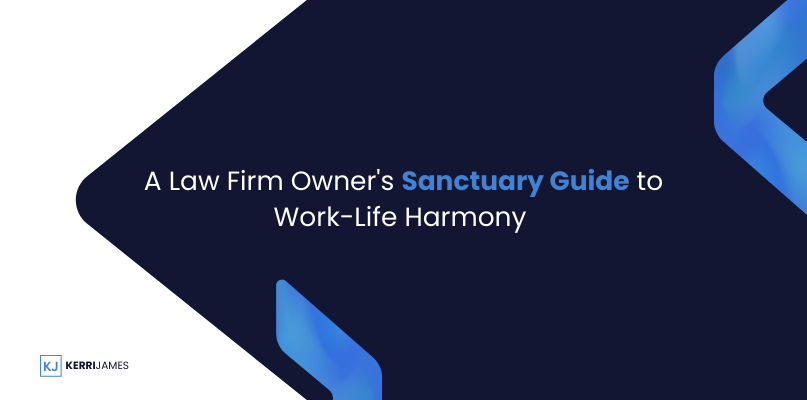The allure of owning a law firm is a siren song for many aspiring legal minds: the pursuit of justice, the thrill of advocacy, the building of a legacy one case at a time. These dreams, however, often collide with the gritty reality of running a law firm. Long hours bleed into stolen weekends, the pressure to bill hours becomes a constant hum in the background, and the weight of client expectations feels perpetually present.
If you’re a law firm owner, you know this feeling all too well. The legal profession, with its inherent demands and high-stakes environment, often glorifies the “always on” mentality, leaving little room for personal well-being. But here’s the hard truth: neglecting your own needs isn’t a sign of strength; it’s a recipe for burnout, strained relationships, and a diminished capacity to serve your clients effectively.
This isn’t just another generic “work-life balance” lecture. This is a deep dive, tailored specifically for the unique pressures faced by law firm owners. We’ll unpack practical strategies, time-tested tips, and crucial mindset shifts needed to reclaim your time, prioritize your well-being, and cultivate a thriving practice without sacrificing your sanity in the process.
The Price of Imbalance: Unveiling the Hidden Costs to Your Health, Relationships, and Practice
The legal profession often fosters a culture of martyrdom, where personal sacrifices are seen as par for the course. But the truth is, ignoring the need for work-life balance isn’t a badge of honor; it’s a dangerous gamble with your health, your relationships, and the long-term sustainability of your firm.
Burnout: The Silent Productivity Assassin: Prolonged exposure to stress, lack of sleep, and the relentless pressure to perform create the perfect storm for burnout. Burnout isn’t just feeling tired; it’s a state of chronic stress that manifests as emotional exhaustion, cynicism, detachment from work, a reduced sense of accomplishment, and a decline in overall well-being. In a profession that demands razor-sharp focus and emotional resilience, burnout is the ultimate saboteur.
The Body Keeps Score: When Neglect Manifests Physically: Chronic stress doesn’t just impact your mood; it sends shockwaves throughout your entire system. Elevated cortisol levels (your body’s stress hormone) contribute to a cascade of health issues, increasing the risk of heart disease, digestive problems, insomnia, anxiety, depression, weakened immunity, and even chronic pain. Ignoring these warning signs isn’t stoic; it’s a surefire way to compromise your health and longevity.
Relationships Fraying at the Edges: The Cost of Disconnection: Constantly being “on” inevitably takes a toll on your relationships. Spouses, partners, children, friends—they all crave your presence, your undivided attention, your energy. When you’re perpetually preoccupied with work, resentment festers, communication breaks down, and the very relationships that provide support and joy become strained.
The Productivity Paradox: The Myth of “Pushing Through”: It’s a common misconception that working longer and harder equates to increased productivity. However, the reality is that overworking often leads to diminished returns. Fatigue, lack of focus, poor decision-making, decreased creativity—these are the hallmarks of a mind stretched too thin. Trying to power through exhaustion ultimately results in more mistakes, decreased efficiency, and a decline in the quality of your work.
Red Flags: Recognizing the Warning Signs Before They Become Full-Blown Crises:
The Digital Leash: Tethered to Technology: You constantly check your phone for work-related emails, messages, or updates, even during personal time, vacations, or those precious moments before sleep. Disconnecting feels like an impossible feat, as if a part of you is always on high alert.
The Elusive “Off” Switch: Switching off from work feels like a foreign concept. You struggle to relax, engage in hobbies, or be fully present with loved ones because your mind is perpetually preoccupied with work-related thoughts, to-do lists, or potential problems.
Your Body Sends an SOS: Persistent headaches, digestive issues, changes in sleep patterns, increased reliance on caffeine or alcohol to cope—these aren’t mere inconveniences; they are your body’s way of signaling distress, a desperate plea for rest and restoration.
The Joy Fades, Replaced by Resentment: Work, once a source of purpose and passion, now evokes feelings of resentment, dread, or apathy. The excitement that once fueled your legal aspirations has waned, replaced by a sense of being overwhelmed, undervalued, and trapped on a never-ending treadmill.
Relationships Strained by Neglect: Loved ones express concern about your workload, you miss important events due to work obligations, or communication becomes strained and infrequent—these are telltale signs that your work-life balance needs urgent attention.
Recognizing these red flags is the first step towards reclaiming control. Ignoring them is akin to sailing into a storm with a torn sail and a broken compass—the damage will be far greater than if you’d addressed the issues early on.
The Power of Boundaries: Establishing Your Non-Negotiables for a Sustainable Practice & a Fulfilling Life
In the legal world, we’re accustomed to thinking of boundaries in terms of contracts, agreements, and legal parameters. But when it comes to work-life harmony, boundaries serve as your personal Bill of Rights, protecting your time, your energy, and your overall well-being from the relentless encroachment of work demands.
Identify Your Non-Negotiables: Your Pillars of Well-Being: What are the personal activities, relationships, or self-care practices that are absolutely essential for you to function at your best? These are your non-negotiables, your sacred pillars of well-being. Whether it’s a daily workout, family dinner time, an hour of uninterrupted reading, a weekly hike in nature, or simply a few moments of quiet meditation, these activities are off-limits for work intrusions. Protect them fiercely.
Schedule “Me Time” with the Same Importance as a Court Appearance: Your personal time is not a luxury; it’s an investment in your well-being and, ultimately, the success of your firm. Treat it with the same level of importance as any client meeting or court deadline. Block out time in your calendar for exercise, hobbies, social engagements, or simply downtime—and make these appointments non-negotiable, just as you would a court appearance or an important client meeting.
Tech-Free Zones: Creating Sanctuaries for Disconnection: Designate specific areas in your home as technology-free zones. The dinner table, the bedroom, your child’s playroom—these are spaces where phones, laptops, and work intrusions are strictly prohibited. This creates physical and mental space for you to fully disconnect from work, engage in meaningful conversations with your loved ones, and be fully present in your personal life.
Setting Client Expectations: Transparency for a Healthier Dynamic: While some clients may expect 24/7 availability, it’s essential to set realistic boundaries from the outset. Clearly communicate your office hours, response times, and availability. This manages expectations upfront, prevents unnecessary stress and resentment on both sides, and allows you to better manage your time and energy, ensuring that you’re fully present and focused when you are working with clients.
Pro Tip: Technology, often blamed for blurring the lines between work and personal life, can also be a powerful ally in setting and maintaining boundaries. Use email filters to prioritize urgent messages, set up automated responses to manage client expectations, and leverage project management software to streamline communication, delegate tasks, and create a sense of control over your workflow.
The Art of Delegation: Empowering Your Team Is an Investment, Not a Liability
As a law firm owner, it’s tempting to cling to the belief that you have to do it all yourself. You’re the expert, the visionary, the one who built the practice from the ground up. However, this “do-it-all” mentality is a one-way ticket to burnout and a surefire way to stifle the growth of both your team and your firm.
Identify Your Delegation Sweet Spot: Not all tasks are created equal. Some require your unique expertise and legal acumen, while others can be effectively handled by others, freeing you up to focus on what you do best. Start by analyzing your workload and identifying tasks that can be delegated, such as administrative duties, legal research, document review, client intake, or even certain aspects of client communication (with proper oversight and training).
Investing in Your Team: A Trained Team is a Strong Team: Delegation without proper training and support is like sending your team into a courtroom without adequate preparation. Invest in your team’s professional development. Provide clear instructions, templates, resources, and ongoing support. Foster an environment where questions are encouraged, and mistakes are viewed as opportunities for learning and growth. A well-trained and supported team is your greatest asset in building a thriving, scalable, and sustainable practice.
Technology: Your Delegation Command Center: Leverage project management software, cloud-based document sharing platforms, and team communication tools to streamline workflows, track progress, ensure accountability, and maintain transparency. This allows you to delegate with confidence, knowing that tasks are being handled efficiently, effectively, and in alignment with your firm’s standards.
Remember: Delegation isn’t about relinquishing control; it’s about leveraging the strengths of your team, fostering their professional development, and creating a more efficient and harmonious work environment.
Finding Your Zen in a World of Zealous Advocacy: Integrating Mindfulness for Greater Focus, Clarity, and Calm
The legal profession, by its very nature, thrives on analysis, strategy, and a relentless pursuit of justice. While these are all admirable qualities, they can also contribute to a state of constant mental overdrive, leaving little room for stillness, reflection, or simply being present in the moment. Mindfulness, the practice of paying attention to the present moment without judgment, offers a powerful antidote to the stress and overwhelm that often permeate the legal profession.
Start Small, Think Big: You don’t need to transform into a meditation master overnight to reap the benefits of mindfulness. Start with just a few minutes each day. Find a quiet space, close your eyes, and simply focus on your breath. Notice the rise and fall of your chest, the gentle flow of air in and out of your nostrils. When your mind wanders (and it will), gently guide it back to your breath without judgment. Apps like Headspace, Calm, and Insight Timer offer guided meditations specifically designed for stress reduction, focus, sleep, and even managing difficult emotions.
Mindful Movement: A Moving Meditation for Body and Mind: Engaging in physical activities that encourage you to be fully present in your body can work wonders for clearing your head, reducing stress, and improving your mood. Yoga, tai chi, qigong, or even a brisk walk in nature, focusing on the sensations of your feet on the ground, the wind on your skin, and the sights and sounds around you, can be incredibly grounding and restorative.
Cultivating Gratitude: A Simple Practice, Profound Impact: Gratitude is like a mental reset button, shifting your focus from what’s lacking to what’s going well in your life. Take a few moments each day to reflect on things you’re grateful for, both personally and professionally. Jot them down in a gratitude journal, share them with a loved one, or simply contemplate them in your mind. This simple practice has been shown to reduce stress, improve sleep, boost happiness levels, and enhance your overall sense of well-being.
Remember: Mindfulness isn’t about emptying your mind of thoughts; it’s about learning to observe your thoughts and emotions without judgment, like clouds passing by in the sky. This awareness allows you to respond to stressful situations with greater clarity, composure, and resilience, rather than reacting from a place of stress and overwhelm.
Building a Culture of Balance: Leading by Example, Not by Exhaustion
As the leader of your firm, your actions set the tone for your entire team. When you prioritize your well-being, you create a ripple effect, fostering a culture that values work-life balance and empowers your team to do the same. Lead by example, demonstrating that it’s possible to be both dedicated and successful while also prioritizing personal well-being.
Time Off is an Investment, Not a Luxury: Encourage your team to take vacations, personal days, mental health breaks, and time to recharge. Discourage the “martyr” mentality that often pervades high-pressure work environments and celebrate those who prioritize their well-being. When your team feels rested and recharged, they return to work with renewed focus, creativity, and enthusiasm, ultimately benefiting your clients and your firm’s bottom line.
Flexibility Fosters Productivity & Happiness: Explore flexible work arrangements, such as remote work days, flextime, or compressed workweeks. This allows your team to better manage their personal responsibilities, reduce commuting stress, and potentially enhance their productivity by working during their peak focus hours. Trust your team to manage their time effectively and you’ll be rewarded with increased morale, loyalty, and a greater sense of ownership over their work.
Team Building: More Than Just Pizza Parties: Invest in team-building activities and social events that foster camaraderie, communication, and a sense of community. This could be anything from a bowling night to a volunteer day at a local charity to a firm retreat focused on professional development and team bonding. The goal is to create opportunities for your team to connect on a personal level, de-stress, and have some fun outside of the office.
Remember: A positive and supportive work environment is essential for attracting and retaining top talent. By leading with empathy, vulnerability, and a genuine concern for your team’s well-being, you create a culture of loyalty, productivity, creativity, and shared success.
Playing the Long Game: Work-Life Integration for Sustainable Success
Achieving work-life balance isn’t about rigidly separating your work life from your personal life as if they exist in two separate, hermetically sealed compartments. It’s about finding a sustainable rhythm that works for you, a dynamic interplay between the two, allowing you to show up fully in both realms without feeling like you’re constantly sacrificing one for the other.
Embrace the Flow: Flexibility is Your Friend: Recognize that there will be busy seasons and lulls in your work, times when you need to be hyper-focused on a case and times when you can afford to have a more flexible schedule. Delegate effectively during demanding times and prioritize personal time when things are calmer. Allow for fluidity and adjust your schedule accordingly, rather than trying to maintain a rigid work-life separation that ultimately leads to stress and resentment.
Outsource, Automate, Elevate: Working Smarter, Not Harder: Constantly seek ways to streamline your operations and free up your time for the tasks that truly require your expertise. Outsource non-essential tasks like bookkeeping or administrative duties, automate repetitive processes like client intake or billing, and delegate whenever possible. This allows you to focus on high-level strategy, nurturing client relationships, and the aspects of your work that you find most engaging and fulfilling.
Seek Support, Find Your Tribe: You Don’t Have to Go It Alone: You don’t have to navigate the challenges of law firm ownership alone. Connect with other law firm owners, join professional organizations, or consider hiring a business coach who understands the unique demands and pressures you face. Having a support system of peers, mentors, or advisors provides invaluable insights, encouragement, accountability, and a safe space to share your challenges and triumphs.
Remember: Building a thriving law practice and living a fulfilling life are not mutually exclusive. It takes conscious effort, setting boundaries, prioritizing your well-being, and giving yourself permission to make choices that honor both your professional aspirations and your personal needs. It’s an ongoing journey, not a destination, but with awareness, commitment, and a willingness to experiment, you can create a practice and a life that feels both successful and deeply satisfying.
The Long-Term Benefits of Prioritizing Your Well-Being as a Law Firm Owner
Investing in your well-being isn’t just about feeling better in the short term; it’s about building a sustainable foundation for long-term success, both personally and professionally. When you prioritize your well-being, you:
Sharpen Your Most Valuable Tool: Your Mind: A well-rested, clear-headed lawyer is a more effective lawyer. When you’re not running on fumes, you’re better equipped to analyze complex legal issues, strategize effectively, and advocate passionately for your clients.
Unlock Your Peak Performance: When you prioritize your physical and mental health, you unlock your full potential. You have more energy, focus, and creativity to bring to your work, which translates into better outcomes for your clients and a greater sense of fulfillment for you.
Cultivate Stronger Relationships: When you’re not constantly tethered to your work, you have more time and energy to invest in your relationships with loved ones. This leads to stronger bonds, greater happiness, and a more fulfilling personal life.
Lead with Authenticity & Inspiration: When you model healthy boundaries and prioritize your well-being, you create a ripple effect throughout your firm. Your team feels empowered to do the same, leading to a more positive, productive, and sustainable work environment.
Increase Your Capacity for Success: Taking care of yourself is an investment in your long-term capacity to lead your firm, serve your clients, and live a fulfilling life. It’s about creating a sustainable rhythm that allows you to thrive both personally and professionally, for years to come.
Remember: You are the heart of your law firm. Take care of your own well-being, and you’ll find that everything else falls into place more easily. You’ll be a better lawyer, a better leader, and a happier, healthier human being. And that’s a win-win for everyone involved.










